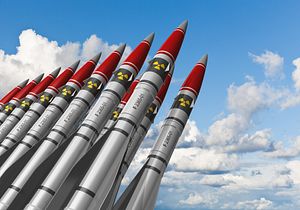Discussion of a “nuclear umbrella” in the Asia-Pacific has traditionally referred to the U.S. strategy of extending nuclear security assurances to non-nuclear weapons states such as Japan, Taiwan and South Korea. From the Chinese perspective, the concept of the “nuclear umbrella” has been relevant only in that China’s growing nuclear potential is a perpetual motivation for U.S. extended deterrence guarantees in Asia.
On December 12, however, the Washington Times reported that China had turned the tables and opened a nuclear umbrella of its own. In early December, Ukrainian President Viktor Yanukovych and Chinese President Xi Jinping signed a bilateral treaty and issued a joint statement that said “China pledges unconditionally not to use or threaten to use nuclear weapons against the nuclear-free Ukraine and China further pledges to provide Ukraine nuclear security guarantee when Ukraine encounters an invasion involving nuclear weapons or Ukraine is under threat of a nuclear invasion.”
From a tactical perspective, Beijing benefits from the pact in the form of both Kiev’s official opposition to calls for Taiwanese independence and continued economic and military cooperation between the two countries. In recent years, Ukraine has provided China with the Zubr-class amphibious hovercraft, the Soviet Varyag aircraft carrier (refurbished into China’s Liaoning aircraft carrier), and hundreds of Russian-made aircraft engines. The partnership guarantees that Ukraine will continue to provide China with military technology and technical expertise as Beijing continues military modernization efforts.
The initial reporting of the pact by Xinhua, China’s state-run news agency, did not use the phrase “nuclear umbrella,” but instead said that through the pact, China is providing Ukraine with a “security guarantee.” According to Wu Dahui, a professor at the Department of International Relations at Tsinghua University in Beijing, the agreement signed in December does not represent a departure from China’s 1994 pledge that it would not use or threaten to use nuclear weapons against Ukraine. According to Wu, the parallels Western commentators are drawing between the wording of the agreement and the “nuclear umbrella” the U.S. extends to its allies in the Asia-Pacific represents a misunderstanding. The security guarantee of the new pact is simply a manifestation of Beijing’s global nonproliferation responsibilities enshrined under the Nuclear Non-Proliferation Treaty.
There is no question that China recognizes value in the concept of a nuclear umbrella. According to Major General Zhu Chenghu, a professor at China’s National Defense University in Beijing, by extending a nuclear umbrella to Ukraine, North Korea, Iran, Myanmar and other countries, China can promote norms of international nonproliferation while simultaneously increasing regional stability. From Beijing’s perspective, a nuclear umbrella could potentially stave off a potentially destabilizing regime collapse in Pyongyang, guarantee a strategic buffer between China and U.S. forces in South Korea, and demonstrate Chinese independence on the global stage. China’s state-run People’s Daily argued that a Chinese nuclear umbrella over Ukraine will allow China to further resist U.S. efforts at nuclear blackmail and coercion, a fundamental component of China’s stated nuclear doctrine.
These tactical benefits of a Chinese nuclear umbrella are overshadowed by the strategic challenges that would arise, particularly if Beijing were to extend nuclear security assurances to Ukraine. First, any nuclear crisis involving Ukraine would likely emanate from Russia. Trade between China and Russia is expected to reach $100 billion by 2015 and Chinese President Xi Jinping has even characterized the Sino-Russia relationship as the “best” among major countries. Therefore any consideration of a nuclear response to a Russian attack on Ukraine would place China in a difficult strategic conundrum.
Second, extending a nuclear umbrella to the Ukraine would require China to abandon its long-standing policy no-first-use (NFU) nuclear pledge, which stipulates that China will not be the first to use nuclear weapons under any circumstances. Responding to a nuclear invasion or threat of nuclear invasion directed at Ukraine would require China to violate NFU. Despite continued Western skepticism over China’s commitment to the pledge, NFU has been a fundamental component of China’s nuclear posture since the country first tested a nuclear weapon in 1964. Chinese leadership has traditionally viewed the NFU pledge not as a self-imposed constraint, but rather as a statement about the fundamental role of nuclear weapons.
There is also the question of whether a Chinese nuclear umbrella over Ukraine would be characterized by the same logic of conventional-nuclear ambiguity that defines Beijing’s own deterrence posture. Under the strategy advanced by former President Hu Jintao, Beijing endorses three components related to conventional-nuclear balance: dual deterrence, dual operations and dual command. With the line between conventional and nuclear attack blurred under such a policy, the threshold at which China would respond to military aggression directed at Ukraine is unclear. Were relations between Russia and Ukraine to deteriorate into large-scale conventional conflict in the future, China’s dual posture may force Beijing to ponder a nuclear response. On the other hand, faced with such military aggression from Russia, the Chinese nuclear umbrella over the Ukraine could fold in the face of much larger strategic concerns.
It is conceivable that China could further international nonproliferation goals by extending a “nuclear umbrella” in the same fashion in which the U.S. extends nuclear security assurances to Japan, South Korea and Taiwan. However, China’s fundamental nuclear doctrine – characterized foremost by NFU, dual deterrence, and a minimum deterrence posture based on a small nuclear arsenal – would face the prospect of radical reform were the concept of the “nuclear umbrella” to be adopted in Beijing.
Christian Conroy is a Washington-based researcher who writes on issues of nuclear weapons and East Asian regional security.
































